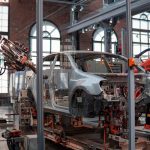Purchasing industrial robots doesn't guarantee a company now has a high-performing item. Manufacturers need to make sure they incorporate their machines into their production line well & continuously optimize their machines. Taking proactive measures to enhance performance will lead to success. What strategies should you implement? Explore Solutions to Improve … [Read more...] about How to Improve Industrial Robot Performance
Robotics
Robotics is becoming prevalent in our lives. It's crucial to understand its implications for the future of work. Discover all you need to know about robotics here.
The Role of Robotics in Personalized Medicine
Over the past two decades, a new trend has emerged in medical science ” personalized medicine, which employs genetic testing and diagnostic tools to help doctors create medication regimens and treatment plans tailor-fit to a patient's biology. The approach, while often much more effective than a trial-and-error approach to care planning, can be difficult to implement. Doctors … [Read more...] about The Role of Robotics in Personalized Medicine
Move towards Lean Operations with Robotic Process Automation
Smart is getting equated with Lean. Enterprises are thinking smart in order to fuel growth through lean operations. Enterprises need to stay agile and competitive and hence they are endeavoring towards lean operations and reducing their operational expenditure is becoming imperative. In both the developed and developing countries the growth is slowing down due to various … [Read more...] about Move towards Lean Operations with Robotic Process Automation
How to Design Food-Safe Robotics
Some industries are more suited to robotics than others. While automation has soared in many manufacturing fields, its use in food production and packaging has been limited until recently. As technology has advanced and demand has grown, food robots are seeing more widespread implementation. Experts predict the food robotics market to more than triple between now and 2027. A … [Read more...] about How to Design Food-Safe Robotics
Enhance Business Productivity through a Digital Platform and Smart Automation
Gone are the days when an enterprise harbored a siloed approach, where different departments worked in four different corners and had their own set of organizational ancestry and lineage. Today, an enterprise, which has true global aspirations, needs to look beyond a siloed work culture. In fact, it has to work together in a wider ecosystem with a self-sustaining target to … [Read more...] about Enhance Business Productivity through a Digital Platform and Smart Automation
What is robotics?
Robotics refers to the branch of technology that deals with designing and operating robots. Robotics also deals with artificial intelligence — the ability of machines to carry out tasks that would normally require human intelligence, like understanding natural language and recognizing objects. Want to learn more about robotics? Datafloq has courses available. Contact us to get started.
What are robots used for?
Robots are used in industrial and commercial settings for welding, fabricating, testing, measuring, and inspection. In addition, they can work in dangerous or difficult environments that would otherwise be unsafe for human workers.
At home, robots are commonly used as vacuum cleaners, lawnmowers, and window cleaners. Some more advanced home robot models can also perform complex tasks such as making a bed or folding laundry. As technology continues to evolve, the number and variety of tasks robots can perform will likely continue to grow.
What are the different types of robots?
There are many different types of robots, each designed for a specific purpose. Some robots are designed for manufacturing tasks, such as welding or fabricating parts. Others are for logistics tasks, such as moving materials around a warehouse. There are also robots that are designed for domestic chores like vacuuming or mowing the lawn.
Each type of robot has its strengths and weaknesses, and the right type of robot for a given task will vary depending on the job’s specific requirements. When choosing a robot, it is important to carefully consider the capabilities of each type to ensure that the right tool is selected for the job at hand.
What are the advantages of robots?
Robots have many advantages over human workers. They can work faster, with more precision, and are not affected by environmental conditions. They can work 365 days a year without rest and don’t require breaks or vacations. Additionally, they are not affected by emotions or physical needs, so they can maintain peak performance at all times.
Robots can also be programmed to perform specific tasks, which helps minimize mistakes. Finally, the long-term costs involved with robots are more affordable, as there is no need for health insurance or other benefits. In short, robots offer several advantages over human workers, making them an attractive option for many businesses.
What is the future of robotics?
In the near future, robots will likely become increasingly commonplace in commercial and residential settings. One area where robots are already making an impact is the healthcare industry. Robots are being used to assist surgeons, transport patients, and dispense medication.
They are also being developed to provide companionship and care for the elderly and infirm. As robotics technology continues to advance, the scope of what robots can do is likely to expand even further. Ultimately, the future of robotics will likely be defined by the imagination of those who create them.







